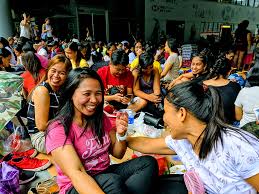Identity Negotiation of Thai Female Migrants in Hong Kong Under the Gaze of Buddhism
Main Article Content
Abstract
This article, which aimed to investigate the complicated identity negotiation of Thai female migrants in Hong Kong, guided by identity, gender, and narrative perspectives, examines the subjective experiences of Thai female migrants from an intersectionality perspective. Based on my ethnographic study of Thai migrants in Hong Kong, the analysis shows that Buddhism has become a symbol of the Thai people to articulate their identity and Thainess, becoming the connection between Thai migrants and Thailand. However, their experiences in terms of the autonomy and freedom for women in Hong Kong society empower them to challenge and question gender inequality and the definition of being a woman. Under these circumstances, subtle idea changes set the way for the negotiation of gender role expectations and reinvent their womanhood in Hong Kong. This study enriches understanding of the dynamic nature of identity negotiation and in-between identity.
Article Details
References
Anthias, F. (2006). “Belonging in a Globalising and Unequal World: Rethinking Translocations”, in Yuval-Davis, N., Kannabiran, K. and Vieten, A.U. (eds.), The Situated Politics of Belonging. London: Sage Publications.
Antonsich, M. (2010). “Searching for Belonging – An Analytical Frame”, Geography Compass, pp. 644-659.
Bao, J. (2008). “From Wandering to Wat: Creating a Thai Temple and Inventing New Space in the United States”, Amerasia Journal, 34(3), pp. 1-18.
____. (2015). Creating a Buddhist Community: A Thai Temple in Silicon Valley. Philadelphia: Temple University Press.
Basch, L.G., Schiller, N.G., & Blanc, C. S. (1994). Nations Unbound: Transnational Projects, Postcolonial Predicaments, and Deterritorialized Nation-States. Pennsylvania, Gordon and Breach.
Butler, J. (1999). Gender Trouble: Feminism and the Subversion of Identity, New York and London: Routledge.
Census and Statistics Department of HKSAR. (2011). 2016 population census: Thematic Report: Ethnic Minorities. Hong Kong: Census and Statistics Department. Retrieved from www.census2016.gov.hk/pdf/EM.pdf
Chamratrithirong, A., Morgan, S.P., and Rindfuss, R.R. (1988). “Living arrangements and family formation”, Social Forces, 66(4), pp. 926–950.
Frable, D.E.S. (1997). “Gender, racial, ethnic, sexual, and class identities”, Annual Review of Psychology, 48(1), pp. 139-162.
Huang, S., Teo, Peggy, and Yeoh, Brenda S.A. (2000). “Diaspora Subjects and Identity Negotiations: Women in and from Asia”, Women’s Studies International Forum, 23, pp. 391-398.
Jirattikorn, A. (2016). “Home of the Housekeeper: Will Shan Migrants Return after a Decade of Migration?” In Su-Ann Oh (Eds), Borders and the State of Myanmar: Space, Power and Practice. Singapore: Institute of Southeast Asian Studies.
Keyes, C. (1995). “Who are the Thai? Reflections on the Invention of Identities.” In Lola Romanucci-Ross and George A. De Vos (eds.), Ethnic Identity: Creation, Conflict and Accommodation. London: Alta Mira Press.
Kirsch, T. (1975). “Economy, Polity and Religion in Thailand.” In G. William Skinner and A. Thomas Kirsch (eds), Change and Persistence in Thai Society: Homage to Lauriston Sharp. Ithaca NY: Cornell University Press.
Massey, D. (1992). Politics and Space/Time. New Left Review, 196, pp. 65–84.
Menjívar, C. (1999). “Religious Institutions and Transnationalism: A Case Study of Catholic and Evangelical Salvadoran Immigrants”, International Journal of Politics, Culture and Society, 12 (4), pp. 589-612.
Potter, M.C. (1976). “Short-term Conceptual Memory for Pictures”, Journal of Experimental Psychology: Human Learning and Memory, 2, pp. 509–522.
Praparpun, Y. (2009). Gender Sensitivity & Accountability in Thai Government Policy Formulation, Implementation & Evaluation from an Historical Perspective. Paper presented at the the IAFFE 2009, Boston, MA.
Sattayanurak, S. (2002). “Intellectuals and the Establishment of Identities in the Thai Absolute Monarchy State”, Journal of the Siam Society, 90(1&2), pp. 101-124.
Schiller, N.G., Basch, L.G., and Blanc, C.S. (1992). Towards a Transnational Perspective on Migration: Race, Class, Ethnicity, and Nationalism Reconsidered. New York: New York Academy of Sciences.
Sutton, C.R. (1992). “Some Thoughts on Gendering and Internationalizing Our Thinking about Transnational Migrations.” In Towards a Transnational Perspective on Migration: Race, Class, Ethnicity, and Nationalism Reconsidered. Vol. 645. New York: Annals of the New York Academy of Sciences,. pp. 241-249.
Virasai, B. (1981). “Buddhism in Cultural, Social and Economic Life.” In Punyasingh, T. (ed.) Buddhism in Thai Life. Bangkok: The National Identity Board.
Wasikasin, W. and Haemaprasith, S. (1996). Value and Attitude of Thai Society to Women and Effect to Family Institute and Social. Bangkok: Faculty of Social Work, Thammasat University.
Wasikasin, W. (2002). Double Standard that Affects the Problem of Gender Inequality in Thailand. Bangkok: Faculty of Social Work, Thammasat University.
Xu, X., Kerley, K.R., & Sirisunyaluck, B. (2011). “Understanding gender and domestic violence from a sample of married women in urban Thailand”, Journal of Family Issues, 32(6), pp. 791–819.
Yuval-Davis, N. (2003). “Belonging: from the Indigene to the Diasporic.” In Umut Ozkirimli (ed.), Nationalism and its futures, Basingstoke: Macmillan.
____. (2006). “Belonging and the Politics of Belonging”, Pattern of Prejudice, 40, pp. 197-214.
____. (2011). Power, Intersectionality and the Politics of Belonging. Aalborg: Institut for Kultur og Globale Studier, Aalborg Universitet. FREIA’s tekstserie, No. 75.


